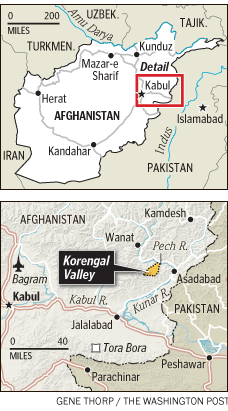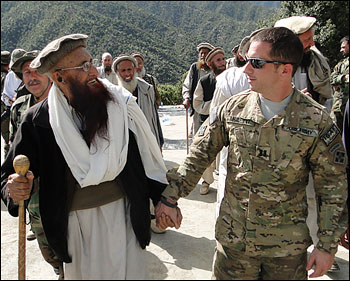U.S. retreat from Afghan valley marks recognition of blunder



Discussion Policy
Comments that include profanity or personal attacks
or other inappropriate comments or material will be removed from the site.
Additionally, entries that are unsigned or contain "signatures" by someone
other than the actual author will be removed. Finally, we will take steps
to block users who violate any of our posting standards, terms of use or
privacy policies or any other policies governing this site. Please review
the full
rules governing commentaries and discussions. You are fully
responsible for the content that you post. |
Thursday, April 15, 2010
KORENGAL VALLEY, AFGHANISTAN -- It was as if the five years of almost ceaseless firefights and ambushes had been a misunderstanding -- a tragic, bloody misunderstanding.
More than 40 U.S. troops have been killed, and scores more wounded, in helicopter crashes, machine-gun attacks and grenade blasts in the Korengal Valley, a jagged sliver just six miles long and a half-mile wide. The Afghan death toll has been far higher, making the Korengal some of the bloodiest ground in all of Afghanistan, according to American and Afghan officials.
In the pre-dawn hours of Wednesday, the U.S. presence here came to an abrupt end.
A day earlier, Capt. Mark Moretti, the 28-year-old commander of American forces in the valley, walked two dozen Korengali elders around his base and told them that the United States was withdrawing. He showed the elders the battle-scarred barracks, a bullet-ridden crane, wheezing generators and a rubber bladder brimming with 6,000 gallons of fuel.
Moretti, the son of a West Point physics professor, and Shamshir Khan, a valley elder whose son had been jailed for killing two U.S. troops, sat together on a small wall near the base's helicopter pad. In keeping with local custom among friends, they held hands.
Moretti gently reminded Khan of the deal they had reached a few days earlier: If U.S. troops were allowed to leave peacefully, the Americans wouldn't destroy the base, the crane and the fuel. Khan assured him that the valley's fighters would honor the deal.
"I hope that when I am gone, you will do what is best for your valley and the villagers," an almost wistful Moretti said.
"I want you to travel safely to your home, to your family," the 86-year-old elder replied. He gazed at the officer through thick glasses that magnified rheumy brown eyes and beamed.
Over the previous week, hundreds of U.S. Army Rangers and Afghan commandos had pushed into the valley to control the high ground the enemy would need for a big attack on departing troops. Dozens of cargo helicopters hauled off equipment. By Wednesday morning, the last Americans were gone.
For U.S. commanders, the Korengal Valley offers a hard lesson in the limits of American power and goodwill in Afghanistan. The valley's extreme isolation, its axle-breaking terrain and its inhabitants' suspicion of outsiders made it a perfect spot to wage an insurgency against a Western army.
U.S. troops arrived here in 2005 to flush out al-Qaeda and Taliban fighters. They stayed on the theory that their presence drew insurgents away from areas where the U.S. role is more tolerated and there is a greater desire for development. The troops were, in essence, bullet magnets.
In 2010, a new set of commanders concluded that the United States had blundered into a blood feud with fierce and clannish villagers who wanted, above all, to be left alone. By this logic, subduing the Korengal wasn't worth the cost in American blood.




